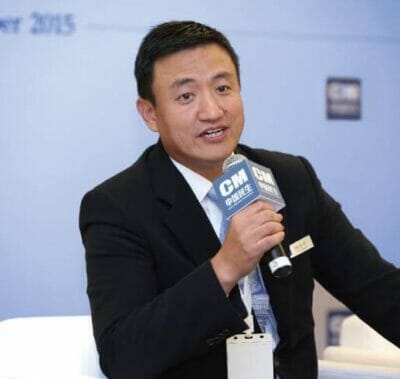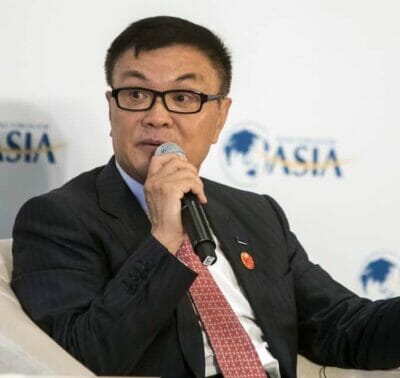
Yang Xiaoping, CMIG’s new co-chairman.
China Minsheng Investment Group (CMIG), the country’s largest privately owned investment group, on Monday appointed Charoen Pokphand Group vice chairman Yang Xiaoping as its new co-chairman, after corruption investigations into its previous directors left a leadership gap that may have contributed to the firm’s recent default on a RMB 3 billion bond default.
The appointment comes as the group, a subsidary of Hong-Kong listed China Minsheng Financial Corporation, wages a dual battle against Beijing’s anti-corruption campaign, which has already reached two of its former chairmen, and China’s credit crunch, partially responsible for the chain of events that led to the company’s default last week.
The company’s new co-chairman, Yang Xiaoping has been a director of CMIG since 2014, and has been associated with Charoen Pokphand, one of Thailand’s biggest conglomerates and the largest foreign investor in China, since 2000.
New Leadership Amidst a Financial Crisis
Yang assumes his new role a day after Shanghai’s Financial Court froze the China Minsheng Investment Group’s stakes in China Minsheng Jiaye Investment Co. and China Minsheng Bund Real Estate Development Co, a pair of property projects worth a cumulative $1.9 billion. That move by the courts followed just under two weeks after CMIG failed to to make a scheduled payment on its bond which was first issued in November last year.
Trading of the company’s bonds was halted on Shanghai’s exchange on Tuesday, after its 2020 bond dropped to RMB 36, down from close to RMB 100, and shares of Minsheng DIT Group Ltd. and Yida China Holdings, both developers partially owned by CMIG, also fell by as much as 32 percent in the days after the default, according to Bloomberg.
The Group, which had 63 investors and RMB 310 billion ($45 billion) in assets as of June, faced $34 billion in debt that same month — one of the biggest debt loads in the nation — after it had engaged in a series of acquisitions in the last two years. CMIG is the parent company of developer SRE Group (1207), as well as of Nasdaq-listed reinsurer Sirius International (which it paid $2.6 billion to acquire in 2016), in addition to holding stakes in Yida China Holdings (3639), and China New Town (1278), among others.
CP Man at the Controls
Yang’s ascension to the top ranks of CMIG, is seen as a sign that Charoen Pokphand and its Thai-Chinese chairman, Dhanin Chearavanont will be taking control over the investment group, which includes 59 of China’s largest private companies among its shareholders.
Yang has been a non-executive director of Ping An Insurance, since 2013 – when CP spent $9.38 billion to acquire a 15 percent stake in the company. Yang also became a non-executive director of CITIC Limited, a Hong-Kong listed unit of CITIC Group, after CP purchased a stake in the firm in 2015.
According to Chinese business publication Caixin, CMIG is tapping new potential investors, including CP Group and CITIC after former shareholders like China Oceanwide Holdings Group pulled out of the group.
CP Group, a sprawling Thai conglomerate with interests in finance, agriculture, retail, and telecom, has worked closely with CMIG in the past. In 2015, for example, CMIG collaborated with the Thai group to build a $2.4 billion network of agriculture bases in China’s Henan province. CP Group’s Chearavanont also serves on CMIG’s global advisory council, alongside former prime minister of France Dominique de Villepin and former Italian prime minister Romano Prodi among other global leaders.
A String of Investigations

Dong Wenbiao, CMIG’s chairman until October of last year.
Yang’s appointment, which was first announced through a WeChat statement, follows the replacement of group founder Dong Wenbiao as chairman by Li Huaizhen in October of last year, as well as a separate corruption investigation into Li Guanrong, chairman of the company’s advisory committee, which has reportedly been ongoing at least since April of 2018.
Li Huaizhen took over the reins of the company after the group’s founder Dong, who brought together the company’s first 59 investors, stepped down amid another graft investigation that began in early 2015. Dong stepped away from his role as chairman of China Minsheng Bank less than a year before the bank’s president Mao Xiaofeng resigned after being implicated in an anti-corruption crackdown alongside former Chinese Community Party Official Ling Jihua.
The new role for Yang is part of a broader reorganization at the firm’s Hong-Kong listed parent, which has seen a barge of high profile board changes in the last year. In June, the firm appointed Cheng Li and Li Wei as executive members of the board. In November 12, it appointed Hu Zhengheng and Wang Yongli, who resigned as vice-president of the Hong-Kong listed Bank of China in 2014 while undergoing a corruption probe.
Adventures of a State-Linked Private Investment Firm
While CMIG has officially denied any financial relationship with China Minsheng Bank, many consider it a spinoff of the financial institution, which is partially owned by the central government, and the private group has been called an entity that “blurred the lines in China … between what’s a private-sector company and what’s a state-owned enterprise,” according to a 2017 investigation by Canadian outlet The Globe and Mail.
CMIG’s friction with Beijing, however, does not stop with its top brass. The chairman of Tomorrow Holdings, one of the 59 founding members of CMIG, has been missing since Chinese police forced him out of his Four Seasons Residence in Hong Kong in January of 2017. Xiao Jianhua, who reportedly had close connections with top government officials, including Xi Jinping, was worth a reported $5.8 billion at the time, a figure which sources quoted by the New York Times say vastly understated the wealth of the tycoon.
In a plot twist that further complicated the narrative leading Yang’s appointment, Xiao attempted to finance CP Group’s purchase of Ping An with money procured from three commercial banks in northern China, a move that was ultimately deemed to violate a 2010 regulation of the China Insurance Regulatory Commission, which prohibited the use of bank loans to acquire insurance firms, according to Dow Jones’ Marketwatch.

Leave a Reply